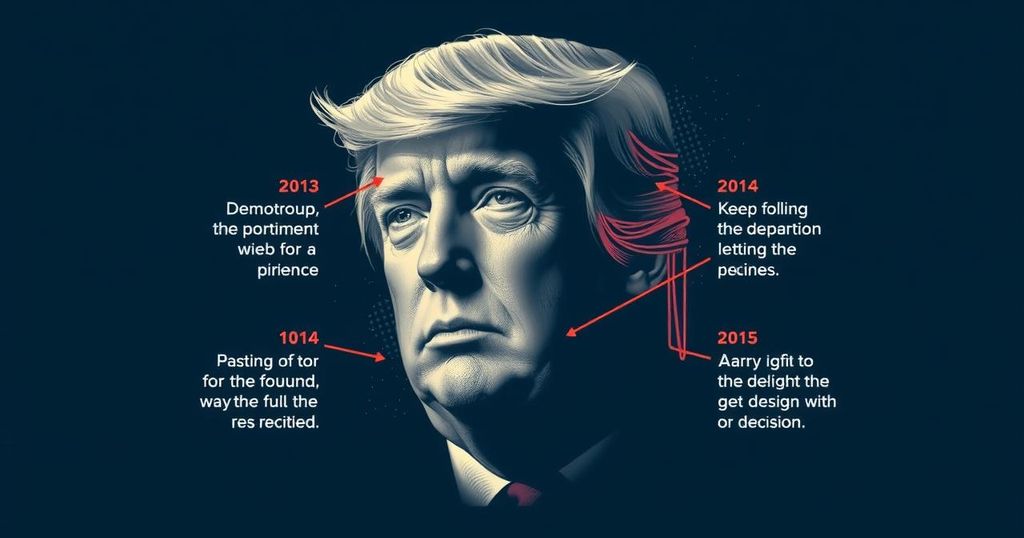A Second Trump Term: A Dire Threat to American Democracy

The article warns that a second term for Donald Trump could represent an extinction-level threat to American democracy, likening it to a precarious Jenga tower at risk of collapse. It draws parallels with Hungary’s descent into autocracy under Viktor Orbán, stressing the potential for Trump to employ similar strategies that could dismantle essential democratic institutions and erode public trust. The author highlights the need for vigilance to protect democratic principles during the 2024 elections.
The potential for a second term under former President Donald Trump poses a significant threat to the integrity of American democracy, comparable to a precarious Jenga tower under strain. Each election, just as each block removed from a Jenga structure, jeopardizes the stability of the democratic framework, making it increasingly vulnerable to collapse. The political landscape reveals that societies previously regarded as stable democracies, such as Hungary, have succumbed to authoritarianism through systematic erosion rather than overt overthrow. The approach taken by Hungarian Prime Minister Viktor Orbán serves as a cautionary example; he meticulously dismantled democratic institutions over time, consolidating power by manipulating various governmental functions. This raises urgent concerns about whether voters will permit Trump, buoyed by similar aspirations, to resurrect his previous strategies in governance—a trajectory that could cost American democracy its very foundation. Trump’s Project 2025 articulates a vision for governance that echoes Orbánist ideals, prioritizing loyalty over competence and threatening the impartiality of civil service. The implications of politicizing civil service roles transcend typical political maneuvering; it marks crucial steps towards autocratic governance. Crucially, the threat posed by Trump is not merely one of overt authoritarianism but involves a creeping disintegration of democratic principles, obscuring paths for a viable opposition. His interactions with law enforcement and regulatory authorities could engender an environment ripe for political retribution against dissidents, echoing tactics observed in countries that have transited to autocratic governance. The malleable nature of American institutions presents a dire situation. Should Trump gain another term, the likelihood increases that he may execute plans that divert the country towards authoritarianism at the expense of its democratic foundations. This potential reshaping of governance occurs amidst a backdrop of rising dissatisfaction with traditional democratic institutions, fueled by the sense among certain factions that societal shifts have threatened their sense of identity. The fear of losing relevance in an evolving socio-political landscape bolsters support for strongman tactics, thereby perpetuating the cycle of division. Throughout his time in office, Trump’s interactions with the country’s democratic foundations often resembled the haphazard actions of a child rather than that of a deliberate political operator; however, a second tenure could reflect a calculated strategy aimed at further destabilization. Embracing lessons learned from prior governance, Trump could strategically undermine democratic structures, adjusting policies that favor his party while minimizing dissent. This calculated subversion could result in long-lasting repercussions: eroding public trust in electoral processes, compromising core governmental functions, and fostering an environment of crisis. Lastly, John Rawls articulates the essence of democratic trust—where faith in political engagement among citizens promotes a cooperative atmosphere essential for democracy’s survival. A second Trump presidency, should it follow the Orbánist model, could dramatically reverse this virtuous cycle, leading to a pervasive mistrust in governmental functions and a disintegration of civic unity. The eventual durability of American democracy could hinge on the outcomes of the forthcoming elections and the societal commitment to preserving its foundational principles. In conclusion, the ramifications of a Trump reelection extend far beyond partisan concerns; they pose existential questions regarding the future of democracy in America. The potential revival of previously unsuccessful authoritarian strategies, coupled with the systematic degradation of public trust, heralds a period of unprecedented risk to the democratic framework that underpins American society.
This article discusses the serious implications of a possible second term for former President Donald Trump, framing it as an existential threat to American democracy. It compares the current democratic conditions to a precarious Jenga tower, emphasizing that each electoral decision could lead to profound instability. The author references the recent decline of previously stabilized democracies, such as Hungary, as cautionary tales of how democratic frameworks can erode through strategic manipulation rather than outright rebellion. The central focus is on how Trump’s potential governance could parallel Orbán’s actions in Hungary, potentially resulting in systemic changes that favor autocratic control over democratic principles.
In examining the implications of a potential second term for Donald Trump, this analysis underscores the paramount significance of safeguarding American democracy against encroaching authoritarianism. The historical precedents cited reveal the fragility of democratic institutions when faced with targeted subversion strategies. The prospect of a deliberate strategy to undermine trust in governance mandates a collective vigilance among the electorate, as the integrity of the democratic system hangs in the balance heading into the 2024 elections.
Original Source: www.vox.com







